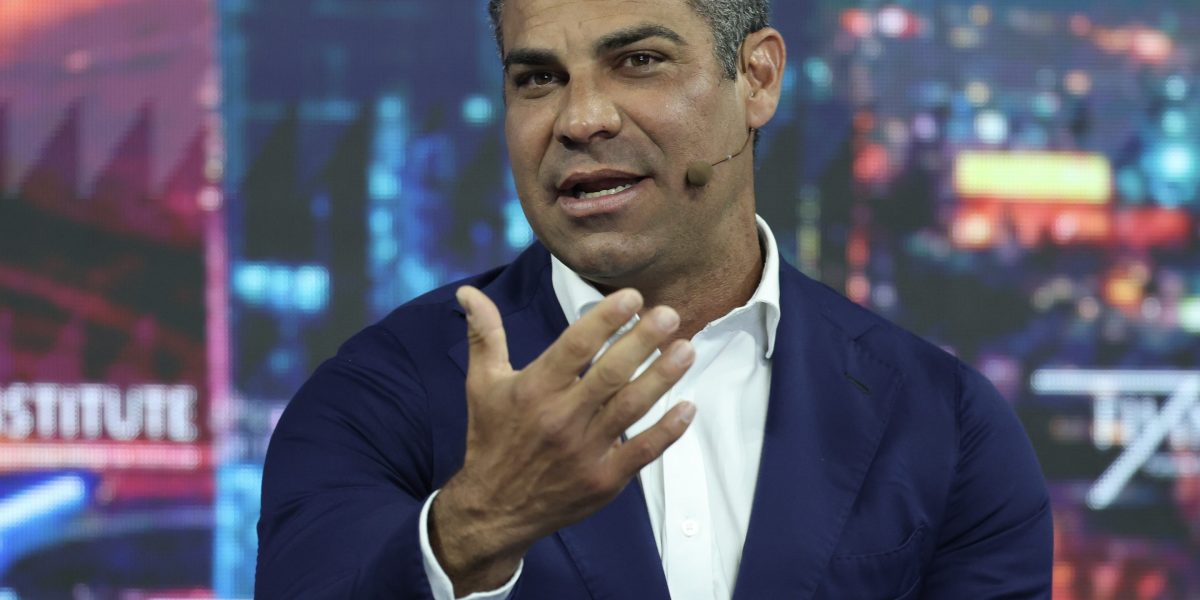Miami’s outgoing mayor warns about what he sees happening in New York and the 2 cities’ different approaches to next summer’s World Cup


Francis Suarez is proud that an adopted Miamian, FIFA chief Gianni Infantino, will be speaking at the upcoming America Business Forum—as will Infantino’s new chum, President Donald Trump. Suarez, who briefly ran a Republican presidential campaign in 2023, hailed Trump in comments to Fortune, calling the president “one of the most consequential political and business leaders of our time,” adding that his perspective on leadership, global business, and America’s role in the world “will be a defining part of this year’s Forum. We are honored to welcome him to Miami.” Suarez also told Fortune that he’s proud Miami is hosting the second-most World Cup games next summer, including the bronze medal game.
After nearly eight years in office, the outgoing mayor is proud of realizing his ambitions to make Miami the “capital of capital,” arguing in an interview with Fortune that it’s “graduated from the capital of Latin America to a truly great global city.” And Suarez has a lot of words for the likely next mayor of New York, Zohran Mamdani, including Mamdani’s campaign to force FIFA to change its ticket pricing strategy.
“This is sort of government overreach, right?” Suarez said. While offering a significant caveat, noting he is not overly familiar with the specifics of Mamdani’s campaign, which accuses FIFA of “price gouging” and urges it to set aside 15% of tickets at discounted rates for working-class New Yorkers, Suarez pivoted to discussion of housing policy. “You see this in the context of rent controls or price controls,” he said, the first of many broadsides he aimed at what he sees happening in New York City politics. “They seem good in the short run, like it makes you feel good, right? Like, hey, we’re going to control prices.”
For his part, Mamdani has framed the issue as one area where government should try to intervene. “Are any working-class New Yorkers actually going to be able to watch any of the matches?” he has asked publicly, accusing FIFA of “pricing working people out of the game that they love” and urging other cities to join his battle against what he described as unchecked greed, as seen in the title of his campaign, “Game over Greed.”
Mamdani claims FIFA’s dynamic pricing model amounts to “price gouging” as tickets for the 2026 FIFA World Cup—hosted across 16 cities, with eight matches and the final at MetLife Stadium—will range from $60 up to $6,730, with prices adjusting to demand. In his petition, Mamdani called for caps on resale prices similar to regulations recently adopted in fellow host country Mexico, situating the fight within a broader movement to protect working people from rising costs.
Mamdani’s campaign did not respond to requests for comment from Fortune. But JPMorgan CEO Jamie Dimon sat down with Fortune earlier in October at the Most Powerful Women summit in Washington DC, and offered some thoughts on how the business class is regarding Mamdani, weeks out of the mayoral election. Dimon said that if Mamdani is elected, he will offer his help. Calling Mamdani’s Democratic Socialist movement “literally more Marxist than socialist,” Dimon alluded to reports of conversations between the two men and Mamdani’s widely reported charm offensive with New York’s business class. Mamdani is “talking to a lot of people, he’s convinced a lot of people [that] he’s going to change [and] he wants to learn.”
Open for business
As for Suarez, the popular two-term Republican mayor has long insisted on government being open for business and small in scope. “When government intervenes,” Suarez told Fortune, “oftentimes the result is catastrophe, it’s chaos.” He said he sees Miami, on the other hand, as “a city where a rising tide lifts all boats,” noting its exceptionally low unemployment (2.9% as of August) and high median wage growth (Asana found it was the highest in the nation from 2020 to 2023, outpacing inflation).
Suarez told Fortune he thinks he’s been a successful mayor because of deliberate policy choices that focused government on narrow quality-of-life issues, a business-friendly attitude, and striking while the iron was hot. He reminded Fortune that it all started with a viral tweet back in December 2020, when he took the idea of transforming South Beach into Silicon Valley seriously. It was far behind his goal coming in, when he merely wanted to help Miami transition away from an industrial economy. That tweet helped him realize, he said, “that there was an inflection point that would allow us to hyperscale.” He said he was an opportunity to squeeze 30 years’ worth of growth into just three or four, and that he’d be proud to be remembered as a social-media mayor.
Suarez said he was wary of Mamdani. “My parents came from a country [in Cuba] where a young, charismatic leader made the same promises. And he did create equality: He created equality of misery, suffering, poverty.”
Still, Suarez and Mamdani have some things in common, especially their telegenic, social-media savvy rises to fame, albeit from opposing political poles. When this dynamic is pointed out, especially the central role of social media in their campaigning, Suarez says he “thinks that’s true,” while quickly clarifying that “anybody who’s young, presumably, is going to be good on social media, right?” Suarez would rather talk about what he sees Mamdani ultimately selling to likely voters: “Are you selling a future that’s going to make things better, or are you selling a road to perdition? And I think he’s selling a road to perdition, whether he’s doing it intentionally or not, whether he actually believes that he can make things better. I have no idea. I don’t know him personally.”
Suarez is eager to reel off the top names he’s recruited to Miami, whether it’s billionaires, celebrities, or major employers. He notes that besides Infantino, the city has attracted Amazon founder Jeff Bezos, Hall of Fame quarterback Tom Brady, soccer superstar Lionel Messi, and hedge fund billionaire Ken Griffin. “These are people that could live anywhere in the world and have chosen to live in Miami.” Suarez notes that he’s an anomaly as the first native-born Miami mayor, and Miami is known for being made up of adopted Miamians.
The mayor also listed Miami’s leading lights in business, with firms such as BlackRock, Blackstone, and Citadel all opening local offices or even headquarters locally. “We’ve attracted companies that manage close to $13 trillion in assets,” he said, and it’s adding notable conferences along with attractions like Formula One and the new Inter Miami soccer stadium. This has all put stress on Miami’s infrastructure, Suarez acknowledged, saying Miami is in some ways a victim of its goal to become “Wall Street South.” He said there’s “definitely a gentrification happening in Miami,” and it has gotten expensive.
In fact, UBS Global Wealth Management’s annual Real Estate Bubble Index, published in late September, put Miami at the very top spot of its global “bubble risk index,” backing Suarez’s argument that it is truly a global city after explosive growth under his tenure. The nearest American cities to Miami on UBS’ list were Los Angeles, San Francisco, and New York, respectively. The Swiss bank noted that Miami’s bubble risk had actually decreased since 2024 and over the past five years, Miami and the similarly sunny and wealthy Dubai have led the pack, averaging real price growth of roughly 50%.
Among all the bubbly real-estate markets, UBS found Miami posting the strongest inflation-adjusted housing appreciation over the past 15 years. Affordability is still near record lows, but housing inventory has rebounded to near pre-pandemic levels as of 2025. “Miami’s coastal appeal and favorable tax environment continue to attract newcomers from the U.S. West and Northeast,” the report noted, with international demand remaining robust, particularly from Latin America.
Suarez blames too many New Yorkers moving in for the inflated real-estate prices. “When people come in, it does put stress on our price affordability. We used to be a lot more affordable than New York, until all the New Yorkers came and now we’re close in price.” He said he sees this continuing under the likely mayorship of Mamdani. “The sense that I have … as interest rates go down, plus people fleeing New York, there will be another wave. You feel it, you sense it, it’s going to have a 20%, 30% impact on values.”
Suburban New York realtors say they are seeing a “Mamdani effect” of more moderate and conservative New Yorkers fleeing ahead of Mamdani’s election, with home sales in contract spiking 15% year-over-year per one local firm. Within the city, Alexander Carter, a licensed real-estate salesperson with the Corcoran Group, previously told Fortune that she had “never seen this type of reaction to a mayor,” having worked in real estate for three or four different tenures. “It’s been pretty drastic. After he won the primary we had a companywide call on implications for business because of the ‘rent freezes.’” She said the Mamdani effect comes down to one thing: “People are afraid it will be bad for business.”
Suarez insists that he doesn’t want Miami to succeed while New York is failing. “I think you want every great American city to succeed.” New York City, by the way, is the only metro area that will host more World Cup games than Miami—all of them across the river, in nearby New Jersey. Although, President Trump has recently hinted that he’ll seek to strip World Cup games from cities that he doesn’t like. Miami surely wouldn’t be one of those.





